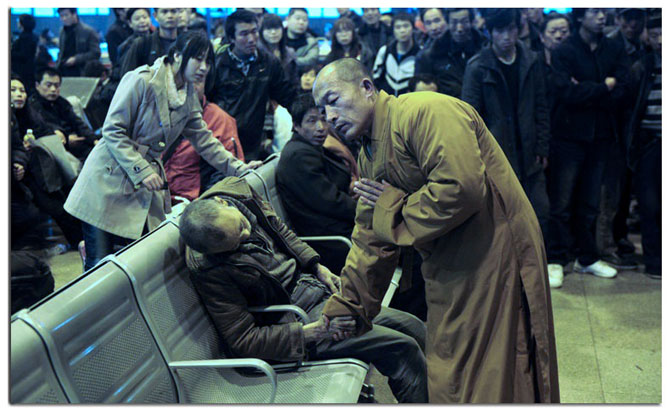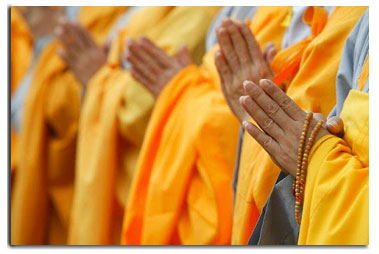
November 25, 2011 - An old man was found dead in the waiting hall of a train station in Taiyuan, the
capital city of North China’s Shanxi Province. Among his fellow passengers was a Buddhist monk.
--- --- ---
"Good health is simply the slowest way a human being can die." - author unknown
Living in the Light of Death Larry Rosenberg
From chapter 3:
1. Everyone must die...
2. The remainder of our life span is decreasing continually.
3. Death will come regardless of whether or not we have made time to practice the dharma.
4. Human life expectancy is uncertain.
5. There are many causes of death.
6. The human Body is very fragile.
7. Our wealth cannot help us.
8. Our loved ones cannot help.
9. Our body cannot help.
A Buddhist Prayer for the Dead and Dying
 Oh Buddhas and Bodhisattvas abiding in all directions, Endowed with great compassion, Endowed with foreknowledge, Endowed with divine eye, Endowed with love, Affording protection to sentient beings, Please come forth through the power of your great compassion, Please accept these offerings, both actually presented and mentally created. Oh Compassionate Ones, you who possess The wisdom of understanding, The love of compassion, The power of doing divine deeds, And of protecting in incomprehensible measure, [...................................] is passing from this world to the next, [He/she] is taking a great leap, The light of this world has faded for [him/her], [He/she] has entered solitude with their karmic forces, [He/she] has gone into a vast silence, [He/she] is borne away by the great ocean of birth and death ..… Oh Compassionate Ones, protect [......................] who is defenseless Be to [him/her] like a mother and father. Oh Compassionate Ones, let not the force of your compassion be weak, but aid them. Let [...........................] not go into the miserable states of existence. Forget not your ancient vows. The Five Powers to Develop for a Happy Successful Death |
(These are explained in the tradition of Thought Transformation; see the Recommended Reading list for books on Thought Transformation)
1. The Power of the White Seed: purify negative karma with the 4 powers of regret, reliance, remedy and resolution; give up attachment to your possessions and make offerings of them; meditate upon refuge in the 3 Jewels, give rise to positive thoughts such as Bodhicitta; reaffirm your commitment to whatever spiritual goals and values you cultivated during your life
2. The Power of Intention: develop in your mind strong, positive resolutions such as not allowing your mind to come under the influence of negative, disturbing emotions; or not letting your mind be separated from the altruistic attitude of Bodhicitta
3. The Power of Remorse: remembering the disadvantages of the disturbing emotions, protect yourself from being overwhelmed by them
4. The Power of Prayer: make strong prayers never to be separated from Bodhicitta, not to be dominated by the misconception of self or the disturbing emotions, to obtain a fortunate rebirth in the next life to be able to continue your practice of the Dharma, etc.
5. The Power of Familiarity: utilize whatever difficulties you face at the time of death to reflect on the teachings, e.g. the suffering nature of samsara, and to develop compassion for all beings; when the time of death comes, lie on your right side with your right ring finger blocking your right nostril (this is the posture the Buddha adopted during his Parinirvana); meditate on “taking and giving”; and on the emptiness of true existence of all things
Further Reading on the Thought Transformation Tradition (the 5 Powers)
· Beresford, Brian, trans. Mind Training Like the Rays of the Sun. Dharamsala: Library of Tibetan Works and Archives, 1992
· Gyalwa Gendun Druppa. Training the Mind in the Great Way. Ithaca, NY: Snow Lion, 1993 trans. by Glenn H. Mullin
· Geshe Rabten and Geshe Ngawang Dhargyey. Advice from a Spiritual Friend. London: Wisdom, 1976, 1984
· Chodron, Pema. Start Where You Are . Shambhala. USA, Aug 2001 (Also other books by this author)
Originally posted on: Urban Dharma

Thank you. I have a feeling many more people than normal are going to be needing this peace soon. Everything is so screwed up.
ReplyDelete